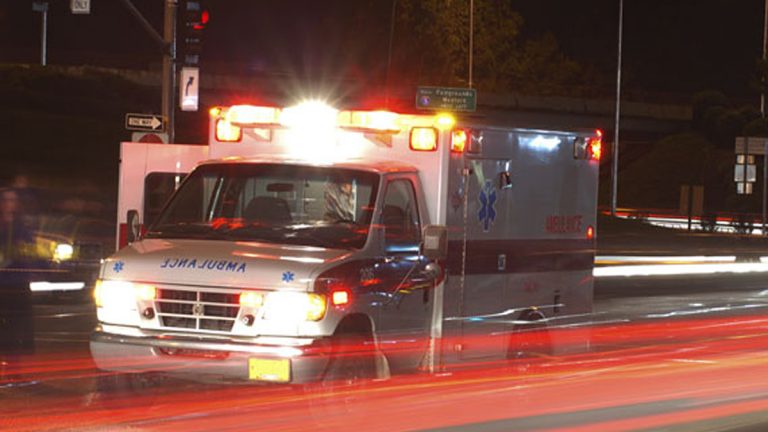Ambulance Wars: New Jersey appellate court rules in favor of Cooper [Updated]

(Big Stock File Photo)
(Updated: Aug 30, 2016.
Virtua has decided not to appeal the New Jersey Superior Court Appellate Division’s August 4, 2016 ruling in the case of Virtua and Capital Health vs. State of New Jersey that allows Level 1 Trauma Centers to be designated as the Mobile Intensive Care Unit (MICU) provider in the municipality in which that trauma center is located. After more than a year of litigating this issue, Virtua has determined that it is time to move forward.
Rich Miller, Virtua President & CEO
Source: Virtua.org
Cooper University Hospital will maintain its lock on paramedic operations in Camden, New Jersey, after wresting the service from South Jersey rival Virtua Health in January following a public battle to control of key aspects of the city’s potentially lucrative emergency transportation.
On August 4, 2016, the Superior Court’s appellate division reversed a trial court decision against the state of New Jersey, upholding a controversial law adopted last summer that gave Cooper a monopoly on Camden’s most critical emergency runs. Virtua had operated the service for nearly four decades and still provides EMS services for dozens of towns in Camden and Burlington counties.
The court backed the state’s argument that Advanced Life Support (ALS) services could be more efficient and better coordinated if handled by a hospital designated as a Level I trauma center – like Cooper – as opposed to one less experienced in treating significant, life-threatening injuries. The court also agreed Cooper’s emergency responders were well positioned to help fill critical gaps in safety-net care and noted the hospital’s contention that its involvement could cut emergency room visits in half in a city that is among the nation’s poorest.
Leaders at Cooper welcomed the news, calling it an “honor and privilege” to care for the people of Camden. But Virtua officials said they were disappointed to learn of the ruling, which overturned what they called a “thorough and well-reasoned decision” issued by the trial court judge in late December 2015. Virtua is now evaluating further legal options.
The dispute flared last summer, when the State Legislature rushed through legislation – signed by Gov. Chris Christie within a month – that gave hospitals with Level I trauma centers the exclusive right to operate ALS services in their home municipality. The law also gave them first refusal in running less intensive Basic Life Support (BLS) service.
BLS is handled by emergency medical technicians responding to 911 calls in an ambulance; ALS involves paramedics dispatched for more serious cases who can perform advanced invasive procedures from a mobile intensive care unit. Both are forms of emergency medical services, or EMS.
Virtua and another hospital system that stands to lose calls filed a legal challenge soon after the legislation was signed last summer, contending the law had been crafted to benefit critical political allies, in particular South Jersey powerbroker George Norcross, Cooper’s chairman.
A trial court judge agreed the measure was unconstitutional in how it privileged certain hospitals, but that decision was put on hold while the state appealed. Cooper took over both ALS and BLS service in Camden within two weeks of the court stay.
Cooper is one of three Level I trauma centers designated by the state Department of Health, along with Robert Wood Johnson University Hospital in New Brunswick and UMDNJ-University Hospital in Newark. Level I trauma centers are specially equipped and organized, with redundant levels of staff trained to treat severely injured patients from car crashes, serious violence, and other traumatic incidents. The state’s seven Level II trauma centers are set up to provide the same level of care but treat fewer patients each year. Virtua does not have a state trauma center designation.
In its decision, the court found that the trial court judge had overstepped in ruling against the legislation, noting it was not the judiciary’s job to evaluate the “efficiency and wisdom” of a law, only to determine its constitutionality. Given what the panel agreed were clear advantages of a Level I facility, the judges found the measure that essentially excluded Virtua could not be considered illegal.
The court stated that it was “undisputed” that Level I centers have greater resources and experience and benefit from university affiliations that result in “clinical advantages” over Level II centers. “It is conceivable that a Level I trauma care center…could provide (emergency) services in a more capable and cost- efficient manner, and that conceivable state of facts provides a reasonable basis for the granting Level I trauma centers the exclusive authority to provide ALS and BLS in the municipalities in which these centers are located,” the decision reads.
But Rich Miller, Virtua president and CEO, defended the hospital’s track record in South Jersey. “Virtua paramedics are proud to continue to provide experienced, award-winning, and high-quality Emergency Medical Services (EMS) for the people in the 76 municipalities Virtua currently serves in Camden and Burlington Counties,” he said.
Miller also said this month’s court decision, and the law it affirmed, raise questions about the oversight of EMS services statewide. The health department licenses BLS providers, but requires a more stringent Certificate of Need (CN) process to approve ALS operations. Virtua has the certificate to operate ALS service throughout Camden and Burlington counties – and has since 1977 — but the new law gave Cooper first dibs on the City of Camden, since it is the only Level 1 trauma center there.
If the law invalidates Virtua’s CN for Camden, Miller wondered what it would mean to the rest of the state. “If this type of legislation can circumvent the MICU (medical intensive care unit) Certificate of Need (CN) process, it calls into question all Department of Health CN regulations for all services throughout the state.”
Dawn Thomas, with DOH, declined to respond to Miller’s comment. However, sources close to the process said the ruling is unlikely to trigger significant change elsewhere soon. The other Level I centers, Robert Wood Johnson and UMDNJ, already handle ALS in their respective hometowns, and service elsewhere is now connected to regional Level II trauma centers.
But the law has posed a concern for Capital Health System, which operates hospitals in the Trenton area and handles paramedic services for Mercer and Hunterdon Counties, prompting it to join Virtua in the lawsuit.
A clause in the law gives preference to facilities that are part of a hospital system that includes a Level I, even if that center is in another location. Robert Wood Johnson operates a hospital in Hamilton, outside of Trenton, and on June 1, RWJ applied to take over ALS in Hamilton as well. Thomas, with DOH, said the department is now reviewing the application.
Thomas Rubino, vice president of communications for Cooper University Health Care, underscored the court’s recognition of the resources associated with a Level I facility. “In the ruling, the Court noted that it is ‘undisputed that Level I trauma centers have greater resources, university-affiliation, and experience’ and other ‘clinical advantages’ that benefit patients in need of emergency services.”
“We, again, thank the governor and the members of the New Jersey Legislature who voted in an overwhelmingly bipartisan fashion to grant Cooper University Health Care the honor and privilege to provide the highest level of emergency care to the people of Camden,” Rubino added.
_________________________________________________________
NJ Spotlight, an independent online news service on issues critical to New Jersey, makes its in-depth reporting available to NewsWorks.
WHYY is your source for fact-based, in-depth journalism and information. As a nonprofit organization, we rely on financial support from readers like you. Please give today.




